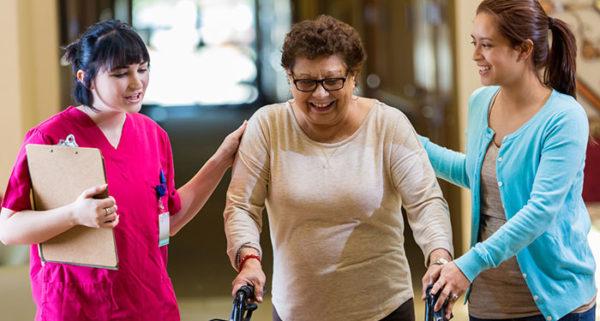
This year, more than one million Americans will get their knees or hips replaced. Joint replacement surgery is becoming an increasingly popular way for those people affected by joint pain and limited mobility to get their lives back. But as soon as the doctor tells you you’re a candidate for replacement surgery the wheels in your head start spinning.
“Understandably, people have a lot of questions,” says Heidi Solem, Coordinator of Altru’s Joint Replacement Center. “They’ll ask, ‘What’s it going to feel like after surgery?’ ‘What should I expect?’ or ‘How long will I need someone to stay at home with me?’”
Luckily, all of those questions are answered at Altru’s Joint Replacement Center. Joint replacement patients are set up with a comprehensive education and exercise program prior to surgery; they also receive outpatient therapy afterwards.
If you or a loved one are pondering joint replacement surgery, here is a timeline of what you can expect.
2 Weeks Before Surgery
About 14 days before surgery, patients getting a total knee or total hip replacement are invited to attend a class about the procedure. Spouses or family are encouraged to attend the class with the patient.
“The surgery not only affects the patient, but also the spouse and family,” Solem says. “So this is a good way to learn what they might need to know to help their loved one after surgery.”
Solem says they’ll fill out paperwork that will help them figure out what they might need post-operatively. This will help them better prepare their home after surgery – things like moving rugs, getting special chairs, planning meals or purchasing necessary equipment.
A therapist will demonstrate exercises that patients will be instructed to start completing that day through surgery that will work on strengthening their upper and lower bodies.
“After surgery, you’ll be using muscles that you might not use all the time. If your upper body isn’t strengthened, you’ll get sore. Some patients aren’t prepared for that,” Solem says.
1 Week Before Surgery
Seven days from surgery, patients might be advised to stop the use of prescription or over-the-counter medications that “thin” the blood.
1 Day Before Surgery
Patients are called by Altru pre-procedure staff and told when to arrive for their scheduled procedure. They’ll also be given any last minute specific instructions about eating, drinking, medications to take and anything else that may pertain to their procedure.
Day of Surgery
When patients get to the hospital they get registered and meet care providers including nurses and anesthesiologists. The patient will be prepped for surgery. Surgery last approximately 1-3 hours and, following it, the patient is sent to the recovery room. During this time, family can track the progress of the patient from screens in the waiting room, and are updated by a provider or nurse on the patient’s status after surgery is complete.
After getting out of surgery, patients won’t stay inactive for long.
“Physical therapists will work with patients within a couple of hours,” Solem says, “We’ve found the sooner we get them up and moving the better they do.”
1-2 Days After Surgery
At this point, patients can change into their own clothing so they can be more comfortable. They’ll be encouraged to be up out of bed the day after surgery. They will work with occupational therapists who will show them how to bathe, dress and shower while recovering.
They’ll also participate in one-on-one physical therapy as well as group therapy.
“We put together small group of people who’ve had the same surgery for group therapy,” she says. “It helps them to see they’re not alone. I’ve had patients build real bonds and friendships during this time.”
“In most cases patients are walking as part of their recovery plan the day of surgery,” shares Dr. Jeremy Gardner, orthopedic surgeon at Altru Orthopedics. “Because of the level of dedicated therapy and support through Altru’s Joint Replacement Center, they’re able to go home within one to two days after their replacement.”
One Week After Surgery
Patients will continue with an at-home exercise program for therapy and may participate in an outpatient physical therapy program. Altru usually advises joint replacement patients to have someone stay with them for three to five days after leaving the hospital. Solem says most of the time, doctors will not clear patients to drive for four to six weeks after surgery. This can be very challenging for both the patient and their spouse or loved ones. That’s another thing that can be worked out and looked at ahead of time through the joint replacement education.
Preparing Ahead Has an Impact
While joint replacement surgery is becoming increasingly more common, that doesn’t mean patients aren’t nervous about it. It’s still major surgery. But when patients do a little homework ahead of time, it seems to contribute to a more positive outcome all the way around, including reduced anxiety and even shorter hospital stays – joint replacement patients have gone from four days to two with the implementation of the comprehensive programming at Altru’s Joint Replacement Center.
“It used to be we did all the teaching while they were in the hospital,” shared Solem. “Right before surgery patients are given so much information that it can be very overwhelming,” she says.
So, if you or a loved one are considering joint replacement, make sure you do your pre-planning, then once you’re in the hospital you can concentrate on healing and recovery.
“Some patients will say to me, ‘I didn’t want to come to class. But I’m so glad I did,’” she says. “They always find it very beneficial. Doing some of the work ahead of time can make all the difference in the world.”
Find more helpful information about Altru’s Joint Replacement Center at altru.org/jrc.







